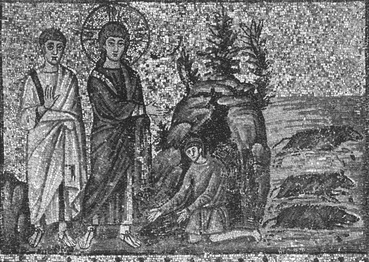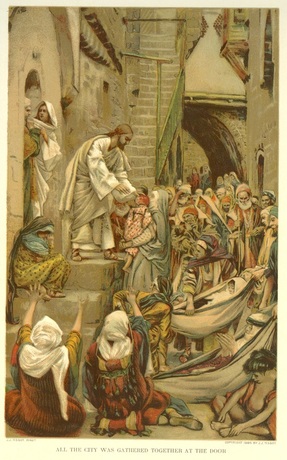 by John Morton The Word and the Church Bible commentary following the Catholic Lectionary (which gives an overview of the entire Bible) by the Fully Alive staff Monday of the Seventh Week in Ordinary Time Readings Click above to view Jas 3:13-18 Ps. 19 Mk. 9: 14-29 In Mark’s gospel we get a more detailed story of Christ healing a demon-possessed child the morning after the Transfiguration (Mt 17:14-23; Lu 9:37-45). Christ comes down the mountain with Peter, James, and John to find the rest of his disciples debating with Pharisees and scribes, likely related to their inability to heal the child. The father reveals his lack of faith, and then risks what little faith he has, when he confronts his insufficiency and recognizes his need for Christ. After Jesus performs the healing he reveals to the disciples that they weren’t able to do it because of their lack of preparation, their lack of prayer. It is appropriate that I am writing my first ever scriptural commentary on this text because it deals with two struggles I commonly face: an insufficiency of faith and an insufficiency of prayer. As a recent convert from atheism to Catholicism I deal continually with doubt, an acknowledged lack of faith, and the deep sadness that each brings. Some assume that after a conversion no lingering doubts or questions arise. It might be assumed that I have ‘made my bed’ and would lie contently there, having closed my mind to other possibilities.  In reality it is quite the opposite. As an atheist I did not doubt my atheism. I had a strong faith in it, a blind faith. Sometimes when under duress I retreated to an agnostic position – if only to save my crumbling arguments – but acquiescing to the “unknowable” was simply a cop out for lacking a well-founded and logical position. From my personal experience I learned that conversion is not something that happens once, or even for a short period of time. It is a process and it takes a lifetime. And though today I do have faith, the strength of that faith sometimes varies, and it is a constant struggle to foster it. The father acknowledges his lack of faith: “but if you can do anything…” If. He is not yet confident in Christ. But then in a humble, small way – as small as a mustard seed – he moves one little step closer to God, opening his heart: “I believe; help my unbelief!” True faith is faith aware of itself, aware of its own failings and insufficiency. Like the father I too must cry out for faith, and must do so often. Though there are times when I am disappointed in the fruits of my labor, the way the disciples were when they failed to heal, I see that Christ does not abandon me. Instead he lifts me up as he did the possessed child, inviting me (and all of us) to pray with expectant faith. God’s graces are not given in quantity according to your firmness in faith, they are given completely to those who are open to it. Whether you have the doors swung wide open, or you are cautiously opening to peak in, the grace of God will pour through whatever opening we give it. Prepare and pray for God to break through any opening you give him. As St. Augustine of Hippo said about this passage: “Where faith fails, prayer perishes. For who prays for that in which he does not believe?... So then in order that we may pray, let us believe, and let us pray that this same faith by which we pray may not falter.” John Morton is a writer and amateur historian from the Twin Cities. An avowed atheist for 15 years, he converted to Catholicism in 2015 after a long discernment process. He continues to study and write on early Christian history, theistic apologetics, and his own personal conversion experience.
0 Comments
Leave a Reply. |
Authors
Erik Ritland received his MA in Theology in 2017. He's the founder and content manager of Fully Alive Christian Media and Rambling On, copy editor and writer for Music in Minnesota, and an acclaimed songwriter. Archives
April 2019
Categories |
 RSS Feed
RSS Feed
